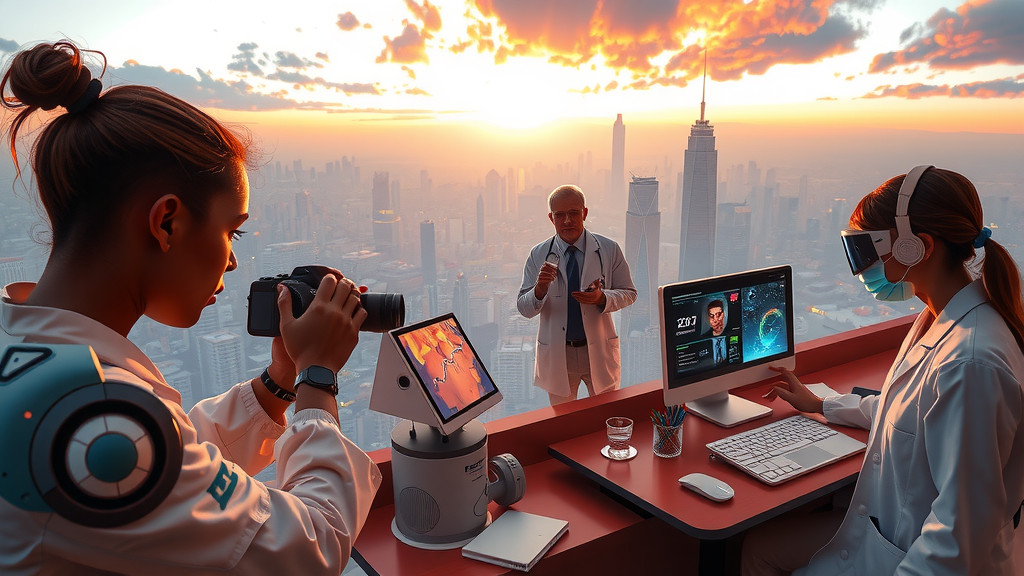The rapid advancement of artificial intelligence (AI) is transforming industries and redefining human interaction, from healthcare and photography to quantum computing and education. As AI continues to evolve, it presents both opportunities and challenges that require careful navigation and ethical considerations.
AI in Photography: A Threat or an Opportunity?
The rise of AI-generated headshots threatens traditional headshot photography. The quality of AI-generated images is improving rapidly, prompting photographers to rethink their business strategies. However, some remain optimistic, offering tips to "AI-proof" their businesses. The key takeaway is that photographers must adapt to technological changes to survive and thrive in this evolving landscape.
AI vs. Quantum Computing: The Race for Supremacy
AI's potential to simulate complex quantum systems could overshadow quantum computing. Researchers like Giuseppe Carleo at the Swiss Federal Institute of Technology believe AI could solve significant problems in chemistry and materials science before large-scale quantum computers become a reality. This shift underscores the rapid pace of AI advancements and its broad applicability across various scientific domains.
AI in Healthcare: Enhancing Patient Care and Efficiency
Healthcare is increasingly leveraging AI to improve patient outcomes and operational efficiency. Platforms like ThinkAndor from Andor Health use AI to automate routine tasks, freeing clinicians to focus on direct patient care. AI-powered virtual nursing and predictive patient monitoring are becoming essential tools in delivering responsive and effective care. The integration of AI with wearable devices and home monitoring systems further enhances post-discharge care, reducing the likelihood of readmission.
The Ethical Dilemmas of AI in Education and Mental Health
AI's role in education and mental health raises ethical concerns. The tragic story of a Florida teenager who developed an unhealthy attachment to a chatbot highlights the potential dangers of AI in young people's lives. Marlee Strawn, a former educator and EdTech entrepreneur, advocates for early AI education and stronger safeguards to ensure responsible technology use. Parents, schools, and communities share the responsibility of preparing kids for an AI-driven world.
The Future of AI: Predictions and Perceptions
Experts' predictions about the timeline for achieving Artificial General Intelligence (AGI) vary widely. While some, like OpenAI's Miles Brundage, believe we could see some form of AGI in the next few years, others, like Meta's Yann LeCun, predict it will take decades. The uncertainty fuels both excitement and caution, with the potential for superintelligence to reshape economic structures, scientific research, and ethical considerations in technology development.
Key Takeaways
- Adaptation is Key: Industries like photography must adapt to AI advancements to remain competitive.
- Broad Applicability: AI's potential spans multiple domains, from healthcare to quantum computing.
- Ethical Considerations: The integration of AI in education and mental health requires robust safeguards and early education.
- Uncertain Future: The timeline for achieving AGI is uncertain, but the potential impact is profound.
As AI continues to evolve, it is crucial for industries, policymakers, and society to collaborate in harnessing its benefits while mitigating its risks.
Sources
- Headshot Photographers: AI Is About To Eat Your Lunch
- This Week’s Awesome Tech Stories From Around the Web (Through November 9)
- Woman Furious When Tattoo Artist Admits Her Half-Finished Tattoo Is AI-Generated
- Here's how far we are from AGI, according to the people developing it
- AI can revolutionize Indonesian businesses, drive growth: expert
- Commentary: Early education in AI is needed before tragedy strikes
- OpenAI backs robots, Amazon and Palantir's defense deal, Saudi Arabia's $100 billion bet: This week's AI launches
- Sam Altman Interview Reveals Bold Vision for Artificial General Intelligence (AGI)
- AI Drives Efficiency And Innovation In Patient Care
- How AI could disrupt the future of health care regulations [PODCAST]
